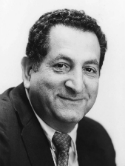Maintaining the dose intensity of ICE chemotherapy with a thrombopoietic agent, PEG-rHuMGDF, may confer a survival advantage in relapsed and refractory aggressive non-Hodgkin lymphoma Journal Article
| Authors: | Moskowitz, C. H.; Hamlin, P. A.; Gabrilove, J.; Bertino, J. R.; Portlock, C. S.; Straus, D. J.; Gencarelli, A. N.; Nimer, S. D.; Zelenetz, A. D. |
| Article Title: | Maintaining the dose intensity of ICE chemotherapy with a thrombopoietic agent, PEG-rHuMGDF, may confer a survival advantage in relapsed and refractory aggressive non-Hodgkin lymphoma |
| Abstract: | Introduction: HDT/ASCT is standard for relapsed and refractory DLCL patients responding to second-line chemotherapy. We incorporated a thrombopoietic agent into the ICE chemotherapy program to potentially: decrease platelet associated toxicities, augment stem cell collection and maintain dose intensity. Methods: This randomized, double-blind, placebo-controlled phase I/II trial examines PEG-rHuMGDF versus placebo with ICE chemotherapy. Phase I compared three cohorts and defined a clinically effective dose (CED). Phase II evaluated the CED versus placebo. Outcome measures included safety, hematological end-points, stem cell collection and the impact of dose-intensity on outcome. Results: Forty-one patients with primary refractory (16) or relapsed DLCL (25) were treated; Response rates for evaluable patients are: 75% (12/16) for placebo and 82% (18/22) for PEG-rHuMGDF. PEG-rHuMGDF treated patients had significantly less grade IV thrombocytopenia, higher median platelet nadirs, and less platelet transfusion per cycle. ICE dose intensity was improved with PEG-rHuMGDF versus placebo: 75 versus 42% (P = 0.008). At 8.5 years median follow-up, overall and event-free survival are 47 and 31%, respectively. Patients treated on PEG-rHuMGDF versus placebo had improved survival (59 versus 31%, P = 0.06). Conclusion: PEG-rHuMGDF ameliorated thrombocytopenia, improved platelet recovery, and maintained ICE dose intensity. Potential survival advantages conferred by maintaining dose intensity require validation with newer thrombopoietic agents. © 2007 European Society for Medical Oncology. |
| Keywords: | adult; cancer survival; clinical article; controlled study; treatment outcome; aged; disease-free survival; middle aged; survival analysis; survival rate; human cell; clinical trial; constipation; placebo; cancer combination chemotherapy; dose response; drug dose comparison; drug efficacy; drug safety; monotherapy; side effect; follow up; carboplatin; controlled clinical trial; multiple cycle treatment; phase 2 clinical trial; neoplasm recurrence, local; etoposide; bleeding; nausea; randomized controlled trial; thrombocytopenia; antineoplastic combined chemotherapy protocols; drug administration schedule; cohort analysis; combination chemotherapy; cyclophosphamide; autologous stem cell transplantation; bone pain; dose-response relationship, drug; drug resistance, neoplasm; transplantation; ifosfamide; abdominal pain; arthralgia; backache; drug fever; dyspnea; drug induced headache; rigor; karnofsky performance status; statistical significance; non-hodgkin's lymphoma; lymphoma, non-hodgkin; probability; recombinant proteins; reference values; stem cell mobilization; brain disease; thrombocyte count; cancer relapse; anxiety; large cell lymphoma; maximum tolerated dose; phase 1 clinical trial; anthracycline derivative; recombinant granulocyte colony stimulating factor; double blind procedure; heart atrium fibrillation; macrogol; polyethylene glycols; thrombocyte transfusion; filgrastim; thrombopoietin; refractory; dose-intensity; relapsed; recombinant megakaryocyte growth and development factor; ice chemotherapy; muscle hypertonia |
| Journal Title: | Annals of Oncology |
| Volume: | 18 |
| Issue: | 11 |
| ISSN: | 0923-7534 |
| Publisher: | Oxford University Press |
| Date Published: | 2007-11-01 |
| Start Page: | 1842 |
| End Page: | 1850 |
| Language: | English |
| DOI: | 10.1093/annonc/mdm341 |
| PUBMED: | 17872903 |
| PROVIDER: | scopus |
| DOI/URL: | |
| Notes: | --- - "Cited By (since 1996): 4" - "Export Date: 17 November 2011" - "CODEN: ANONE" - "Source: Scopus" |
Altmetric
Citation Impact
BMJ Impact Analytics
MSK Authors
Related MSK Work










